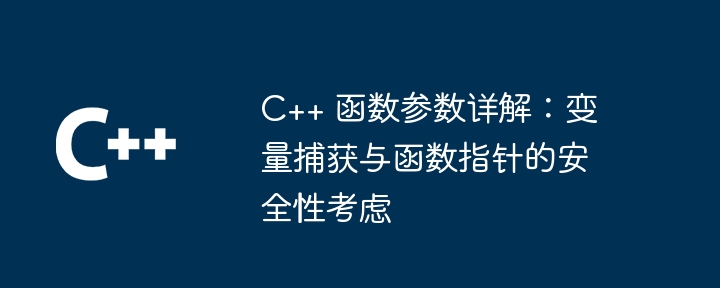
Function parameters in C allow functions to access external variables. Variable capture involves capturing a reference or pointer to access an external variable after the function returns, which can cause problems. Safety considerations for function pointers involve the risk of modifying external variables when a function pointer captures a variable reference. To avoid these problems, it is recommended to use references and pointers with caution, dispose of them properly before functions return, clear function pointers, and follow robust programming practices.

C Detailed explanation of function parameters: Security considerations of variable capture and function pointers
In C, function parameters are functions A form that allows access from within a function to variables from outside the function. It is critical to understand function parameters and how they relate to variable capture and function pointer safety.
Variable capture
Variable capture may occur when the function parameter is a reference or pointer. Variable capture refers to capturing references or pointers to variables in the scope outside a function so that these variables can still be accessed after the function returns. This can lead to unexpected results or even cause the program to crash.
Example:
#include <iostream>
using namespace std;
void changeValue(int &value) {
value = 10;
}
int main() {
int var = 5;
changeValue(var);
cout << var << endl; // 输出: 10
return 0;
}In this example, the changeValue function takes a reference as a parameter, thereby capturing the var A reference to a variable. After the function returns, it can still access the var variable and modify its value.
Safety considerations for function pointers
Function pointers are variables that store function addresses. Security considerations also occur when a function pointer captures a reference or pointer to a variable in the scope outside the function. Because function pointers can still point to these variables after the function returns, modifying these variables inside the function can corrupt program state.
Example:
#include <iostream>
using namespace std;
void dangerousFunction() {
int x = 5;
int *ptr = &x; // 捕获 x 变量的指针
}
int main() {
dangerousFunction();
int y = 10;
*ptr = y; // 危险操作,可能会导致内存错误
cout << y << endl;
return 0;
}In this example, the dangerousFunction function captures the pointer to the x variable. After the function returns, the pointer still points to the x variable. When the main function executes *ptr = y, it actually modifies the value of the y variable. This can lead to memory errors or other undefined behavior.
Recommendations for avoiding variable capture and function pointer safety issues:
nullptr. The above is the detailed content of Detailed explanation of C++ function parameters: security considerations of variable capture and function pointers. For more information, please follow other related articles on the PHP Chinese website!
 What are the differences between c++ and c language
What are the differences between c++ and c language
 Recommended learning order for c++ and python
Recommended learning order for c++ and python
 Cost-effectiveness analysis of learning python and c++
Cost-effectiveness analysis of learning python and c++
 Is c language the same as c++?
Is c language the same as c++?
 Which is better to learn first, c language or c++?
Which is better to learn first, c language or c++?
 The difference and connection between c language and c++
The difference and connection between c language and c++
 C++ software Chinese change tutorial
C++ software Chinese change tutorial
 Cost-effectiveness analysis of learning python, java and c++
Cost-effectiveness analysis of learning python, java and c++




